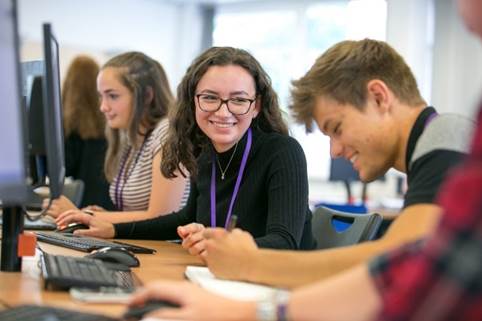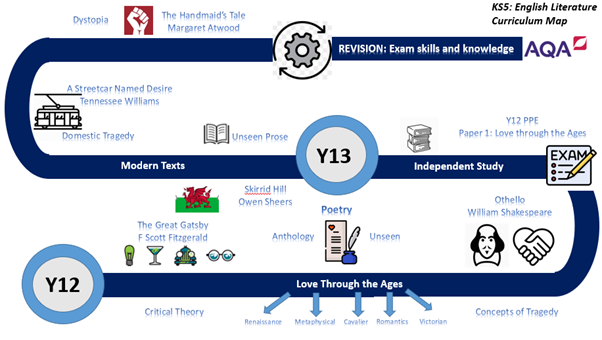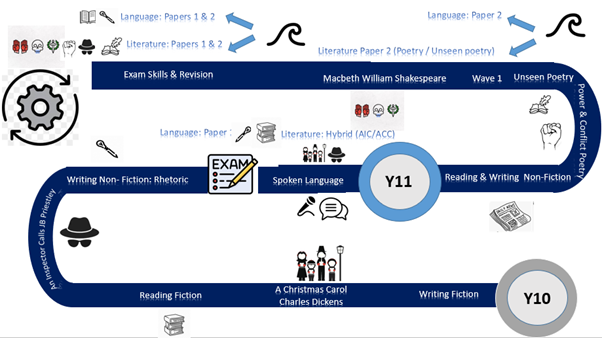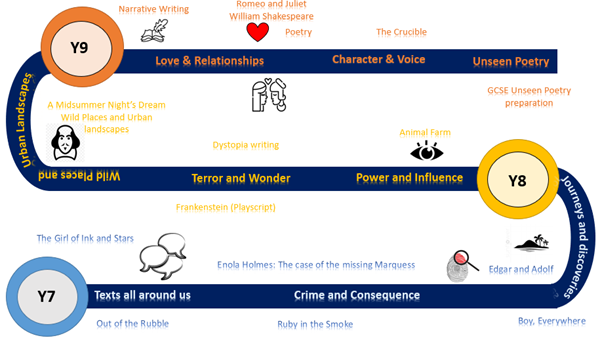English
Who We Are:

- Mrs M Lloyd – Curriculum Leader for English
- Mrs A Giles – Literacy Leader
- Mrs S Pepper – KS3 Leader
- Mrs A Ali
- Mrs C Armstrong
- Miss L Clitheroe
- Mr L Hadley – Curriculum Leader for Media
- Miss P Leggatt
- Mrs K Massey – Deputy SENCo/ Pupil Premium Champion
- Ms M Meanwell
- Miss M Perrett
- Miss N Root
The English curriculum teaches students to refine their interpretations of a text and their ability to express their opinions. Students learn to wield vocabulary appropriate to their purpose and audience, and to communicate increasingly sophisticated ideas clearly and coherently.
Key Stage 3
At Key Stage 3, we are committed to offering an inclusive English curriculum that fosters a passion for literature from across the world:
- we promote independent and active learning
- students are given opportunities to develop skills in reading, writing and oracy (spoken language), the understanding they develop of grammar, linguistics, academic literary concepts, context and form
- we explore the literary canon
Between year 7 and year 9, students read narratives, drama texts and poetry across the literary canon. They are also given opportunities to analyse media and non-fiction texts. The schemes of learning encourage the acquisition of a depth and breadth of vocabulary and expand their ability to write for specific audiences and purposes. In order to reflect the diversity of both our student body and the world they live in, we explore texts from different eras and cultures.
Home Learning is set regularly to promote independent learning and the consolidation of skills learnt in class. This will either be independent tasks, or using platforms like Kerboodle. In addition to the home learning activities, we have regular library lessons, and students are encouraged to read there as well as at home on a regular basis.
KS3 teachers use Flash Marking to monitor progress and to identify the progress of key skills. Flash Marking is an Education Endowment Fund initiative that breaks down writing components into building blocks to help students grasp the mechanics of English writing. Work done in class is marked regularly, and clear feedback is given for students to reflect and act upon. Students can use this detailed feedback to improve their skills, and the assessments focus both on their understanding of the texts as well as their mastery of the skills they have been learning (evidenced through the Flash Marking codes they have learnt).
We hope that our KS3 students enjoy the opportunities available to engage creatively and continue to develop their skills and are thrilled to be able to provide them with a variety of English-focused extra-curricular clubs (book club, creative writing club, etc.). We also enjoy taking the students out on trips to the theatre or organise workshops within school to experience the texts they study brought to life in a different context.
Key Stage 4
Examination Board: AQA
We teach our English Language and English Literature course in an integrated manner, interleaving the study of novels, drama, poetry, non-literary texts and creative writing. Students also get the chance of showing their flair and ability to write through the creative and persuasive components of the Language GCSE, taking ownership of the skills they have seen established authors used.
There are no tiers in English; all students sit the same papers for both courses: AQA English Language (8700) and AQA English Literature (8702).
Given that they are core subjects, all students will study both English Language and English Literature. Each course is assessed at the end of Y11 with 100% examination.
Each year we review the best pathway for our students: all KS4 students are set in English to support their attainment and ensure that they access the curriculum fully.
The English department also makes use of GCSEPod and SenecaLearning (revision websites) to consolidate knowledge. We also subscribe to Massolit (university lectures aimed at KS4 students) to model academic language. The department uses workshops and visits to the theatre or to Poetry Live to bring these texts to life.
We request students purchase their own copy of the texts that are studied at GCSE, so they can make detailed annotations, and so they can use them to support their revision:
English Literature GCSE texts:
Macbeth – William Shakespeare
A Christmas Carol – Charles Dickens
An Inspector Calls – J B Priestley
Power and Conflict Poetry – Anthology provided by the school
Progression:
At the Emmbrook School, we currently offer English Literature at A-Level. Entry requirements are 5 in GCSE English Language and 6 in GCSE English Literature. Even if you choose not to study English at A-level, well-developed English skills are vital in all areas of Sixth Form study as well as in the workforce.



October 2025
